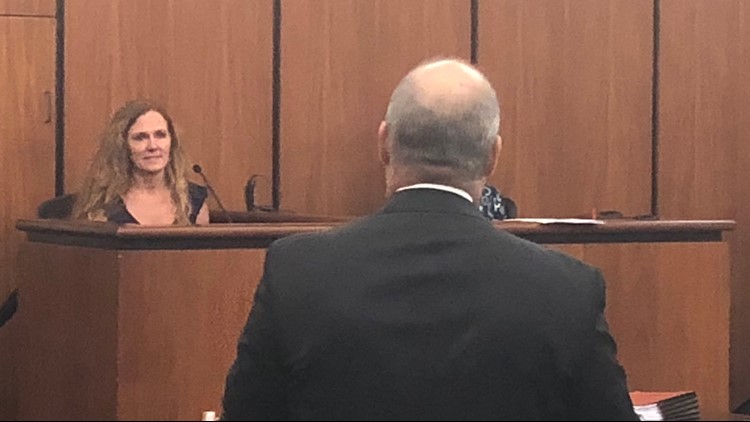Columbia, SC (WLTX) — Day three of the public corruption trial of former state representative Jim Harrison began Wednesday morning at the Richland County Courthouse. Harrison has been charged with two counts of misconduct in office, two counts of perjury, and one count of criminal conspiracy.
Witnesses on day three included:
+ Rep. Todd Rutherford who has experience working with Harrison on the House Judiciary Commission in 2002-2012. Rutherford testified that as Chairman of the Judiciary, Harrison could determine which bills came up for discussion, set the calendar and assign bills to different sub-committees. Harrison could also choose who headed up each committee within the Judiciary.
Rutherford also spoke about the role of lobbyists and was asked about lobbying efforts of SCANA, South Carolinians for Responsible Government (for school choice), Palmetto Health, BlueCross/BlueShied SC, University of South Carolina, BellSouth, and AT&T. The list of lobbyists is important because they were clients of Richard Quinn & Associates (RQA).
Special Prosecutor David Pascoe has been trying to tie Harrison to RQA and for accepting money from RQA while in the legislature.
+ Adam Piper, employed at Richard Quinn & Associates (RQA) from March 2008 to December 2010 as a political consultant, explained the typical work day and pay scale at RQA. He described working 50 to 60 hour weeks for less than $35,000.
At RQA, Piper worked on political campaigns for the likes of Joe Wilson, Cameron Runyon, Alan Wilson, Henry McMaster, and Curtis Loftis. He testified that, to his knowledge, he never saw Harrison working on a political campaign other than his own.
+ Gregory Phillips, the Custodian of Records at Oak Inc., the repository of AOL Mail.
Phillips was in court to verify that all of the emails gathered in evidence and presented in court were in fact originated through the email accounts at RQA. The emails were obtained via search warrant of RQAs computers and servers and contain messages between RQA principal officers and include mentions of Harrison and his relationship with RQA.
+ a progression of former corporate lobbyist principals -- including Charles McFadden, former senior vice president of governmental affairs for SCANA; James D'Alessio, current vice president of governmental affairs for BlueCross/BlueShield of SC; Pamela Lackey, retired president of AT&T and former director of government relations for BellSouth and AT&T; and Charles Beaman, former CEO of Palmetto Health and current co-CEO of PrismaHealth.
This group took the stand one after another and were asked about their company's relationship with RQA, how much the company paid RQA, and did they know at the time that Harrison was receiving money as a salaried employee at RQA.
Lackey thought Harrison performed legal work at RQA because he was an attorney and said she would have ended the agreement between AT&T and RQA because she "doesn't normally hire firms with legislators on the payroll." McFadden, D'Alessio, and Beaman expressed the same sentiment.
D'Alessio was asked about the retainer BlueCross/BlueShield of SC paid to RQA in 2008.
Up until that point, the healthcare insurance company had been working for years to try to get the Tobacco Tax bill passed with no luck. One of the legislators consistently voting against the bill was Harrison, who was siding with then-Gov. Mark Sanford to oppose any tax increases in the state. BC/BS hired RQA in 2008, paying them $15,000 to help advocate for the bill. The Tobacco Bill passed, Sanford's veto was overridden, and the bill became law in 2009. Harrison was the Chairman of the Judiciary in 2008 and was also accepting a salary of $80,000 from RQA at the time.
Perhaps the most intriguing testimony came from Rebecca Quinn Mustian.
Mustian is Richard Quinn's daughter and was the Chief Financial Officer and bookkeeper for RQA, beginning in 2000. She testified that Harrison had an office at RQA up until 2009.
The prosecution used her to read in to court record the emails and other documents that had been seized through a search warrant of RQA offices and computers. The prosecution stated that the emails had been verified as business-related, sent between Richard Quinn, Rick Quinn and Mustian, and established Harrison's employment and terms of compensation at RQA.
One email from Richard Quinn, dated Sept. 8, 2010, began with "Yikes! That's well over $1 million bucks." The message was in response to Rebecca Quinn's email about the total compensation to Rep. Jim Merrill ($350,000) and Harrison (over $811,000) over a ten year span at RQA.
Mustian also verified what may be a bookkeeping record from around 2001 that shows Harrison's compensation involved corporate, rather than political, clients.
It shows
+ BellSouth paid RQA $5,000 per month, Harrison the consultant paid $2,000 per month
+ Burroughs & Chapin paid RQA $7,500 per month, Harrison the consultant paid $220 per month
+ SCANA paid RQA $9,750 per month, Harrison the consultant paid $2,000 per month
+ Unisys paid RQA $4,700 per month, Harrison the consultant paid $2,350 per month
The total compensation for Harrison was $3,285 per bi-weekly check, for a total of $82,125 per year. That annual salary made Harrison the third highest paid employee at RQA, behind Richard Quinn (just over $180,000) and Rick Quinn ($123,797). Mustian was being paid $67,880.
RQA was handling political clients such as Lindsey Graham, Charlie Condon, John Hawkins, and Alan Wilson at the time, but Trey Walker was listed as the main political campaign consultant. Walker was paid a percentage of the political clients' retainer rather than a flat fee.
In October 2010, Harrison was taken off his salaried position and his pay was trimmed to $2,000 per month as a contract employee. Payments to Harrison from RQA ended on Nov. 6, 2012 when Harrison left office. Rick Quinn had returned to the House in 2010.
Defense attorney Hunter Limbaugh called the documents into question, asking Mustian if they might have been used as bookkeeping practice, rather as an actual schedule or record of payment.
Limbaugh cited that Mustian had entered a plea agreement with the State in exchange for her testimony and had her describe for the jury the impact that the overall investigation of RQA, not just of Harrison, has had on her father and the family business.



